Jinn
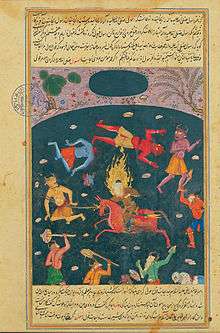
Jinn (Arabic: الجن, al-jinn), also romanized as djinn or anglicized as genies, are supernatural creatures in early Arabian and later Islamic mythology and theology. An individual member of the jinn is known as a jinni, djinni, or genie (الجني, al-jinnī). They are mentioned frequently in the Quran (the 72nd sura is titled Sūrat al-Jinn) and other Islamic texts and inhabit an unseen world, another universe beyond the known universe. The Quran says that the jinn are made of a smokeless and "scorching fire",[1] but are also physical in nature, being able to interact in a tactile manner with people and objects and likewise be acted upon. The jinn, humans, and angels make up the three known sapient creations of God. Like human beings, the jinn can be good, evil, or neutrally benevolent and hence have free will like humans.[2] The shaytan jinn are akin to demons in Christian tradition, but the jinn are not angels and the Quran draws a clear distinction between the two creations. The Quran states in Sūrat al-Kahf (The Cave), Ayah 50,[3] that Iblis (Azazel) is one of the jinn.
Etymology
Jinn is an Arabic collective noun deriving from the Semitic root JNN (Arabic: جَنّ / جُنّ, jann), whose primary meaning is "to hide". Some authors interpret the word to mean, literally, "beings that are concealed from the senses".[4] Cognates include the Arabic majnūn ("possessed", or generally "insane"), jannah ("garden"), and janīn ("embryo").[5] Jinn is properly treated as a plural, with the singular being jinni.
The anglicized form genie is a borrowing of the French génie, from the Latin genius, a guardian spirit of people and places in Roman religion. It first appeared[6] in 18th-century translations of the Thousand and One Nights from the French,[7] where it had been used owing to its rough similarity in sound and sense.
Pre-Islamic Arabia
Archeological evidence found in Northwestern Arabia seems to indicate the worship of jinn, or at least their tributary status, hundreds of years before Islam: an Aramaic inscription from Beth Fasi'el near Palmyra pays tribute to the "ginnaye", the "good and rewarding gods",[8][9] and it has been argued that the term is related to the Arabic jinn.[10] Numerous mentions of jinn in the Quran and testimony of both pre-Islamic and Islamic literature indicate that the belief in spirits was prominent in pre-Islamic Bedouin religion.[11] However, there is evidence that the word jinn is derived from Aramaic, where it was used by Christians to designate pagan gods reduced to the status of demons, and was introduced into Arabic folklore only late in the pre-Islamic era.[11] Julius Wellhausen has observed that such spirits were thought to inhabit desolate, dingy and dark places and that they were feared.[11] One had to protect oneself from them, but they were not the objects of a true cult.[11]
Islam
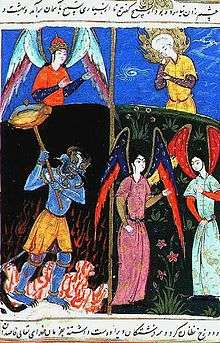
In Islamic theology jinn are said to be creatures with free will, made from smokeless fire by Allah as humans were made of clay, among other things.[12] According to the Quran, jinn have free will, and Iblīs abused this freedom in front of Allah by refusing to bow to Adam when Allah ordered angels and jinn to do so. For disobeying Allah, Iblīs was expelled from Paradise and called "Shaytān" (Satan). Jinn are frequently mentioned in the Quran: Surah 72 (named Sūrat al-Jinn) is named after the jinn, and has a passage about them. Another surah (Sūrat al-Nās) mentions jinn in the last verse.[13] The Qurʾan also mentions that Muhammad was sent as a prophet to both "humanity and the jinn", and that prophets and messengers were sent to both communities.[14][15]
They are usually invisible to humans, but humans do appear clearly to jinn, as they can possess them. Jinn have the power to travel large distances at extreme speeds and are thought to live in remote areas, mountains, seas, trees, and the air, in their own communities. Like humans, jinn will also be judged on the Day of Judgment and will be sent to Paradise or Hell according to their deeds.[16]
Classifications and characteristics
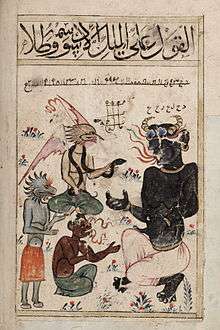
The social organization of the jinn community resembles that of humans; e.g., they have kings, courts of law, weddings, and mourning rituals.[17] One common belief in Muslim lore lists five distinct orders of demons — the Marid (the strongest type), the Ifrit, the Shaitan, the Jinn, and the Jann (the weakest type). A few traditions (hadith), divide jinn into three classes: those who have wings and fly in the air, those who resemble snakes and dogs, and those who travel about ceaselessly.[18] described them as creatures of different forms; some resembling vultures and snakes, others tall men in white garb.[19] They may even appear as dragons, onagers, or a number of other animals.[20] In addition to their animal forms, the jinn occasionally assume human form to mislead and destroy their human victims.[21] Certain hadiths have also claimed that the jinn may subsist on bones, which will grow flesh again as soon as they touch them, and that their animals may live on dung, which will revert to grain or grass for the use of the jinn flocks.[22]
Ibn Taymiyyah, an influential late medieval theologian whose writings would later become the source of Wahhabism,[23] believed the jinn to be generally "ignorant, untruthful, oppressive and treacherous."[24] He held that the jinn account for much of the "magic" perceived by humans, cooperating with magicians to lift items in the air unseen, delivering hidden truths to fortune tellers, and mimicking the voices of deceased humans during seances.[24]
In Sūrat al-Raḥmān, verse 33, God reminds jinn as well as mankind that they would possess the ability to pass beyond the furthest reaches of space only by His authority, followed by the question: "Then which of the favors of your Lord will you deny?" In Sūrat Al-Jinn, verses 8–10, Allah narrates concerning the jinn how they touched or "sought the limits" of the sky and found it full of stern guards and shooting stars, as a warning to man. It goes on further to say how the jinn used to take stations in the skies to listen to divine decrees passed down through the ranks of the angels (Sura al Jinn verse 9),[25] but those who attempt to listen now (during and after the revelation of the Qurʾan) shall find fiery sentinels awaiting them. The Quran forbids their association with God, and advises men not to worship jinns instead of Him, Quran Says " And they (Pagan Arabs) imagine kinship between Him and the jinn, whereas the jinn know well that they will be brought before (Him)", Quran Surah 37, Verse 158.
Seven kings of the Jinn are traditionally associated with days of the week.[26]
- Sunday: Al-Mudhib (Abu 'Abdallah Sa'id)
- Monday: Murrah al-Abyad Abu al-Harith (Abu al-Nur)
- Tuesday: Abu Mihriz (or Abu Ya'qub) Al-Ahmar
- Wednesday: Barqan Abu al-'Adja'yb
- Thursday: Shamhurish (al-Tayyar)
- Friday: Abu Hasan Zoba'ah (al-Abyad)
- Saturday: Abu Nuh Maimun
Qarīn
A related belief is that every person is assigned one's own special jinni, also called a qarīn, and if the qarin is evil it could whisper to people's souls and tell them to submit to evil desires.[27][28][29] The notion of a qarin is not universally accepted among all Muslims, but it is generally accepted that Shayṭān whispers in human minds, and he is assigned to each human being.
In a hadith recorded by Muslim ibn al-Hajjaj, the companion Abdullah, son of Masud reported: 'The Prophet Muhammad said: 'There is not one of you who does not have a jinnī appointed to be his constant companion (qarīn).' They said, 'And you too, O Messenger of Allah?' He said, 'Me too, but Allah has helped me and he has submitted, so that he only helps me to do good.' [30]
In Muslim cultures

The stories of the jinn can be found in various Muslim cultures around the world. In Sindh the concept of the Jinni was introduced during the Abbasid Era and has become a common part of the local folklore which also includes stories of both male jinn called "jinn" and female jinn called "jiniri". Folk stories of female jinn include stories such as the Jejhal Jiniri.
Other acclaimed stories of the jinn can be found in the One Thousand and One Nights story of "The Fisherman and the Jinni";[31] more than three different types of jinn are described in the story of Ma‘ruf the Cobbler;[32][33] a mighty jinni helps young Aladdin in the story of Aladdin and the Wonderful Lamp;[34] as Ḥasan Badr al-Dīn weeps over the grave of his father until sleep overcomes him, and he is awoken by a large group of sympathetic jinn in the Tale of ‘Alī Nūr al-Dīn and his son Badr ad-Dīn Ḥasan.[35]
During the Rwandan genocide, both Hutus and Tutsi avoided searching in local Rwandan Muslim neighborhoods and widely believed myths that local Muslims and Mosques were protected by the power of Islamic magic and the efficacious jinn. In Cyangugu, arsonists ran away instead of destroying the mosque because they believed jinn were guarding the mosque and feared their wrath.[36]
Solomon and the Jinn
According to traditions, the jinn stood behind the learned humans in Solomon's court, who in turn, sat behind the prophets. The jinn remained in the service of Solomon, who had placed them in bondage, and had ordered them to perform a number of tasks.
And before Solomon were marshalled his hosts, of jinn and men and birds, and they were all kept in order and ranks. (Quran 27:17)
The Qurʾan relates that Solomon died while he was leaning on his staff. As he remained upright, propped on his staff, the jinn thought he was still alive and supervising them, so they continued to work. They realized the truth only when Allah sent a creature to crawl out of the ground and gnaw at Solomon's staff until his body collapsed. The Qurʾan then comments that if they had known the unseen, they would not have stayed in the humiliating torment of being enslaved.
Then, when We decreed (Solomon's) death, nothing showed them his death except a little worm of the earth, which kept (slowly) gnawing away at his staff: so when he fell down, the jinn saw plainly that if they had known the unseen, they would not have tarried in the humiliating penalty (of their task). (Qurʾan 34:14)
Ibn al-Nadim, in his Kitāb al-Fihrist, describes a book that lists seventy Jinn lead by Fuqtus, including several Jinn appointed over each day of the week[37][38] Bayard Dodge, who translated al-Fihrist into English, notes that most of these names appear in the Testament of Solomon.[37] A collection of late fourteenth- or early fifteenth-century magico-medical manuscripts from Ocaña, Spain describes a different set of Jinn (termed "Tayaliq") again under Fuqtus (here named "Fayqayțūš"), blaming them for various ailments.[39][40]
Other cultures

In the Guanche mythology
In Guanche mythology from Tenerife in the Canary Islands, there existed the belief in beings that are similar to genies,[41] such as the maxios or dioses paredros ('attendant gods', domestic and nature spirits) and tibicenas (evil genies), as well as the demon Guayota (aboriginal god of evil) that, like the Arabic Iblīs, is sometimes identified with a genie.[42] The Guanches were of Berber origin in North Africa.
Christian sources
Van Dyck's Arabic translation of the Old Testament uses the alternative collective plural jann (الجان al-jānn) to render the Hebrew word usually translated into English as "familiar spirit" (אוב , Strong #0178) in several places (Leviticus 19:31, 20:6, 1 Samuel 28:3,7,9, 1 Chronicles 10:13).[43]
In popular culture

Gallery
-

Zulqarnayn with the help of some jinn, building the Iron Wall to keep the barbarian Gog and Magog from civilized peoples (16th century Persian miniature).
-

-
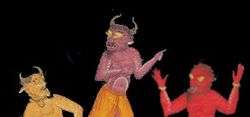
-
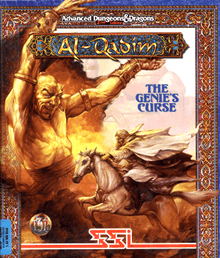
-

-

page from 14th/15th-century manuscript Kitab al-Bulhan or Book of Wonders
-

Huma, a three-headed demon
-

Zawba‘a or Zoba'ah, the demon king of Friday
-

Tabia - female demon assisting with childbirth.
-

Šamhūraš or Shamhurish, the demon king of Thursday
-

Maymūn, the demon king of Saturday
See also
- Daeva
- Demonology
- Devil (Islam)
- Djinn (comic book)
- Genie in popular culture
- Genius loci
- Genius (mythology)
- Ghoul (Evil jinn who dwell within graveyards)
- Marid
- Houri
- Nasnas
- Peri
- Qareen
- Qutrub
- Rig-e Jenn
- Shayṭān (Troops of Shayṭān headed by Iblis)
- Shedim
- Theriocephaly
- Will of the wisp
- Winged genie
- Yazata
References
- ↑ Qur’ān 15:27
- ↑ El-Zein, Amira. "Jinn", 420–421, in Meri, Joseph W., Medieval Islamic Civilization – An Encyclopedia.
- ↑ Surat Al-Kahf (18:50) – The Holy Qur'an – القرآن الكريم
- ↑ Edward William Lane. "An Arabic-English Lexicon".. p. 462.
- ↑ Wehr, Hans (1994). Dictionary of Modern Written Arabic (4 ed.). Urbana, Illinois: Spoken Language Services. p. 164. ISBN 978-0-87950-003-0.
- ↑ Oxford English Dictionary, 3rd ed. "genie, n." Oxford University Press (Oxford), 2014.
- ↑ Arabian Nights' entertainments, Vol. I, 1706, p. 14.
- ↑ Hoyland, R. G., Arabia and the Arabs: From the Bronze Age to the Coming of Islam, p. 145.
- ↑ Jonathan A.C. Brown. Muhammad: A Very Short Introduction Oxford, 2011.
- ↑ Javier Teixidor. The Pantheon of Palmyra. Brill Archive, 1979. p. 6
- 1 2 3 4 Irving M. Zeitlin (19 March 2007). The Historical Muhammad. Polity. pp. 59–60. ISBN 978-0-7456-3999-4.
- ↑ Quran 55:14–15
- ↑ Quran 116:4–4
- ↑ Quran 51:56–56
- ↑ Muḥammad ibn Ayyūb al-Ṭabarī, Tuḥfat al-gharā’ib, I, p. 68; Abū al-Futūḥ Rāzī, Tafsīr-e rawḥ al-jenān va rūḥ al-janān, pp. 193, 341
- ↑ Tafsīr; Bakhsh az tafsīr-e kohan, p. 181; Loeffler, p. 46
- ↑ Ṭūsī, p. 484; Fozūnī, p. 527
- ↑ Fozūnī, p. 526
- ↑ Fozūnī, pp. 525–526
- ↑ Kolaynī, I, p. 396; Solṭān-Moḥammad, p. 62
- ↑ Mīhandūst, p. 44
- ↑ Abu’l-Fotūḥ, XVII, pp. 280–281
- ↑ "Ibn Taymiyyah". Encyclopedia Britannica. Retrieved 16 January 2015.
- 1 2 Ibn Taymiyyah, al-Furqān bayna awliyā’ al-Raḥmān wa-awliyā’ al-Shayṭān ("Essay on the Jinn"), translated by Abu Ameenah Bilal Phillips
- ↑ http://quran.com/72
- ↑ Robert Lebling (30 July 2010). Legends of the Fire Spirits: Jinn and Genies from Arabia to Zanzibar. I.B.Tauris. p. 87. ISBN 978-0-85773-063-3.
- ↑ Quran 72:1–2
- ↑ Quran 15:18–18
- ↑ Sahih Muslim, No. 2714
- ↑ Sahih Muslim, Book 39, Hadith No. 6759
- ↑ The fisherman and the Jinni at About.com Classic Literature
- ↑ Idries Shah - Tales of the Dervishes at ISF website
- ↑ MA’ARUF THE COBBLER AND HIS WIFE
- ↑ The Arabian Nights - ALADDIN; OR, THE WONDERFUL LAMP at About.com Classic Literature
- ↑ The Arabian Nights - TALE OF NUR AL-DIN ALI AND HIS SON BADR AL-DIN HASAN at About.com Classic Literature
- ↑ Kubai, Anne (April 2007). "Walking a Tightrope: Christians and Muslims in Post-Genocide Rwanda". Islam and Christian-Muslim Relations (Routledge, part of the Taylor & Francis Group) 18 (2): 219–235. doi:10.1080/09596410701214076.
- 1 2 Bayard Dodge, ed. and trans. The Fihrist of al-Nadim: A Tenth-Century Survey of Muslim Culture. New York: Columbia University Press, 1970. pp. 727-8.
- ↑ Robert Lebling. Legends of the Fire Spirits: Jinn and Genies from Arabia to Zanzibar. I.B. Taurus, 2010. p.38
- ↑ Celia del Moral. Magia y Superstitión en los Manuscritos de Ocaña (Toledo). Siglos XIV-XV. Proceedings of the 20th Congress of the Union Européenne des Arabisants et Islamisants, Part Two; A. Fodor, ed. Budapest, 10–17 September 2000. pp.109-121
- ↑ Joaquina Albarracin Navarro & Juan Martinez Ruiz. Medicina, Farmacopea y Magia en el "Misceláneo de Salomón". Universidad de Granada, 1987. p.38 et passim
- ↑ Los guanches y los perros llegaron juntos a Tenerife
- ↑ Guanche Religion
- ↑ Van Dyck's Arabic Bible
Bibliography
- Al-Ashqar, Dr. Umar Sulaiman (1998). The World of the Jinn and Devils. Boulder, CO: Al-Basheer Company for Publications and Translations.
- Barnhart, Robert K. The Barnhart Concise Dictionary of Etymology. 1995.
- "Genie". The Oxford English Dictionary. Second edition, 1989.
- Abu al-Futūḥ Rāzī, Tafsīr-e rawḥ al-jenān va rūḥ al-janān IX-XVII (pub. so far), Tehran, 1988.
- Moḥammad Ayyūb Ṭabarī, Tuḥfat al-gharā’ib, ed. J. Matīnī, Tehran, 1971.
- A. Aarne and S. Thompson, The Types of the Folktale, 2nd rev. ed., Folklore Fellows Communications 184, Helsinki, 1973.
- Abu’l-Moayyad Balkhī, Ajā’eb al-donyā, ed. L. P. Smynova, Moscow, 1993.
- A. Christensen, Essai sur la Demonologie iranienne, Det. Kgl. Danske Videnskabernes Selskab, Historisk-filologiske Meddelelser, 1941.
- R. Dozy, Supplément aux Dictionnaires arabes, 3rd ed., Leyden, 1967.
- H. El-Shamy, Folk Traditions of the Arab World: A Guide to Motif Classification, 2 vols., Bloomington, 1995.
- Abū Bakr Moṭahhar Jamālī Yazdī, Farrokh-nāma, ed. Ī. Afshār, Tehran, 1967.
- Abū Jaʿfar Moḥammad Kolaynī, Ketāb al-kāfī, ed. A. Ghaffārī, 8 vols., Tehran, 1988.
- Edward William Lane, An Arabic-English Lexicon, Beirut, 1968.
- L. Loeffler, Islam in Practice: Religious Beliefs in a Persian Village, New York, 1988.
- U. Marzolph, Typologie des persischen Volksmärchens, Beirut, 1984. Massé, Croyances.
- M. Mīhandūst, Padīdahā-ye wahmī-e dīrsāl dar janūb-e Khorāsān, Honar o mordom, 1976, pp. 44–51.
- T. Nöldeke "Arabs (Ancient)", in J. Hastings, ed., Encyclopaedia of Religion and Ethics I, Edinburgh, 1913, pp. 659–73.
- S. Thompson, Motif-Index of Folk-Literature, rev. ed., 6 vols., Bloomington, 1955.
- S. Thompson and W. Roberts, Types of Indic Oral Tales, Folklore Fellows Communications 180, Helsinki, 1960.
- Solṭān-Moḥammad ibn Tāj al-Dīn Ḥasan Esterābādī, Toḥfat al-majāles, Tehran.
- Moḥammad b. Maḥmūd Ṭūsī, Ajāyeb al-makhlūqāt va gharā’eb al-mawjūdāt, ed. M. Sotūda, Tehran, 1966.
Further reading
- Crapanzano, V. (1973) The Hamadsha: a study in Moroccan ethnopsychiatry. Berkeley, CA, University of California Press.
- Drijvers, H. J. W. (1976) The Religion of Palmyra. Leiden, Brill.
- El-Zein, Amira (2009) Islam, Arabs, and the intelligent world of the Jinn. Contemporary Issues in the Middle East. Syracuse, NY, Syracuse University Press. ISBN 978-0-8156-3200-9.
- El-Zein, Amira (2006) "Jinn". In: J. F. Meri ed. Medieval Islamic civilization – an encyclopedia. New York and Abingdon, Routledge, pp. 420–421.
- Goodman, L.E. (1978) The case of the animals versus man before the king of the Jinn: A tenth-century ecological fable of the pure brethren of Basra. Library of Classical Arabic Literature, vol. 3. Boston, Twayne.
- Maarouf, M. (2007) Jinn eviction as a discourse of power: a multidisciplinary approach to Moroccan magical beliefs and practices. Leiden, Brill.
- Zbinden, E. (1953) Die Djinn des Islam und der altorientalische Geisterglaube. Bern, Haupt.
External links
| Wikimedia Commons has media related to Genies. |
| Look up genie in Wiktionary, the free dictionary. |
| Wikisource has the text of the 1905 New International Encyclopedia article Jinn. |
| ||||||||||||||||||||||||||||||||||||||||||||||||||||||||||||||||||||||||||||||||||||||||||||||||||||||||||||||||||||||||||||||||||||||||||||||||||||
